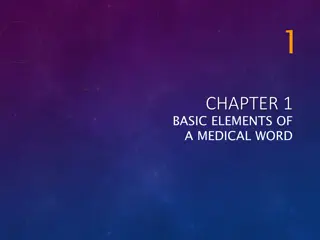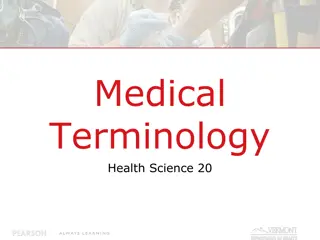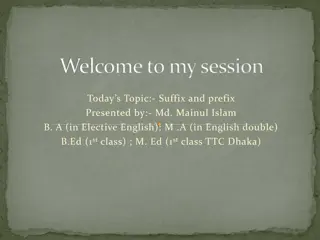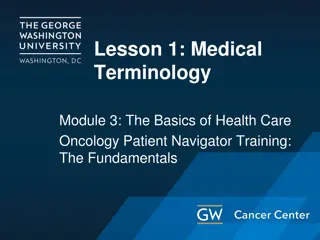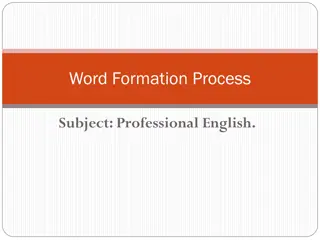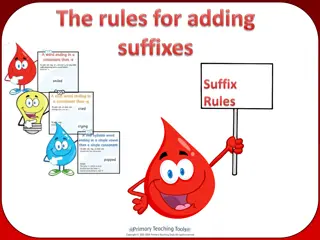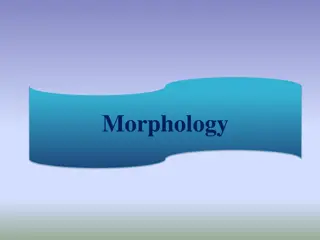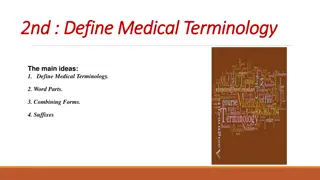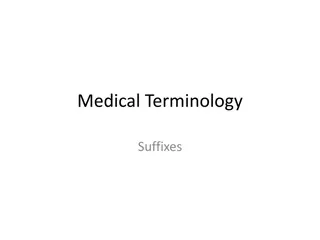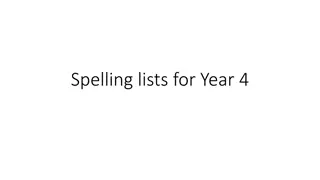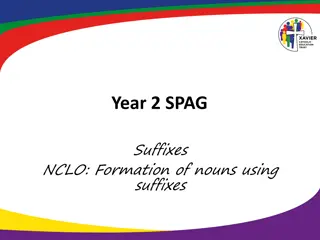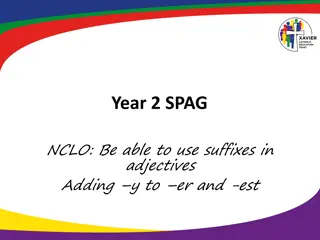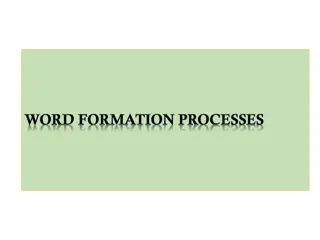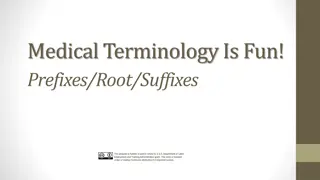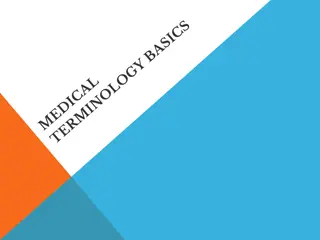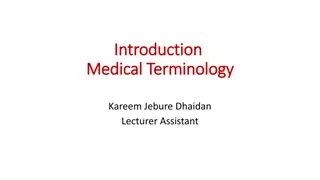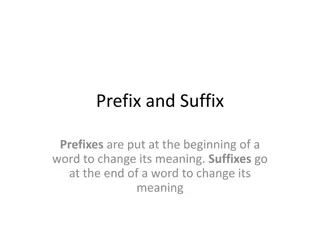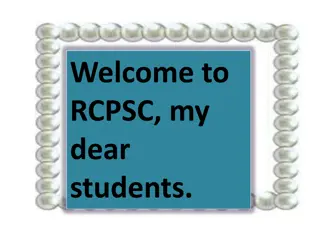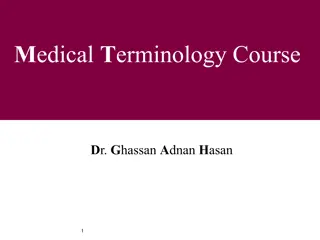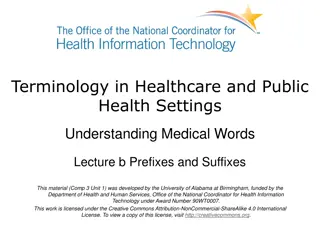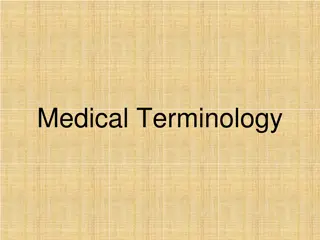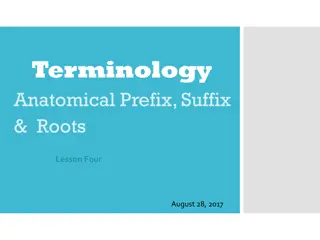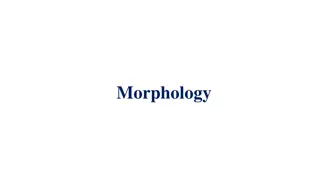Understanding Medical Terminology: Suffixes and Their Meanings
Dive into the realm of medical terminology suffixes and their significance in altering the meanings of terms. Explore various types of suffixes like grammatical, diagnostic, pathological, surgical procedure, and disease-related. Learn examples of noun suffixes and their definitions, shedding light o
1 views • 12 slides
Understanding Medical Terminology: Prefixes and Suffixes in Healthcare
Medical terminology involves compound words that define aspects of the body and diseases. This lecture covers the basics of medical terms, including word roots, combining forms, prefixes, and suffixes. Proper pronunciation is crucial in healthcare to avoid potentially life-threatening errors. Exampl
2 views • 27 slides
Understanding Medical Terminology: Suffixes and Their Importance in Healthcare
Explore the significance of suffixes in medical terminology, how they modify word meanings, and the importance of dissecting terms to understand their components. Learn how suffixes denote conditions, aid in pronunciation, and convey crucial information in healthcare terminology.
4 views • 65 slides
Understanding Medical Word Elements: Roots, Combining Forms, Suffixes, and Prefixes
Medical terminology uses word elements like roots, combining forms, suffixes, and prefixes. Word roots provide the main meaning, combining forms connect elements, suffixes modify word meaning, and prefixes are placed at the beginning of words. Examples illustrate how these elements are used in medic
5 views • 13 slides
Medical Terminology Health Science 20
Medical terminology is a specialized language used in healthcare to describe medical concepts concisely. It consists of prefixes, root words, and suffixes, which can be broken down to define complex terms. Utilizing proper medical terminology enhances communication among healthcare professionals and
3 views • 16 slides
Enhancing Reading Skills Through Effective Strategies
Learn how to improve reading proficiency by leveraging letter-sound correspondences, syllabication patterns, and morphology. Enhance word recognition capabilities, reading comprehension, and oral reading fluency. Discover valuable techniques such as leveraging prefixes and suffixes, mastering multi-
0 views • 19 slides
Understanding Suffixes and Prefixes in English Language
Dive into the world of suffixes and prefixes with Md. Mainul Islam B. A. as he explores their usage in various contexts. Learn how these linguistic elements modify root words to convey different meanings. Practice completing text exercises to enhance your understanding of suffixes and prefixes in En
0 views • 11 slides
Understanding Word Meanings Through Roots and Affixes in Education
Exploring how to decipher unfamiliar words by analyzing their roots, prefixes, and suffixes from a linguistic perspective. Latin roots and examples are provided to demonstrate how word parts contribute to the overall meaning of a word.
1 views • 69 slides
Basics of Medical Terminology in Health Care Oncology
This module provides training on medical terminology basics for patient navigators in oncology. It covers defining terms using prefixes, root words, and suffixes, common oncology words, and available resources. Learn how to approach medical terminology effectively by understanding word roots and com
1 views • 20 slides
Understanding Degrees of Comparison in English Grammar
Degrees of comparison in English grammar refer to the different forms of adjectives and adverbs used to indicate the level of comparison between different qualities. This includes the positive degree for basic descriptions, the comparative degree for comparing two things, and the superlative degree
0 views • 17 slides
Various Word Formation Processes in Professional English
Coinage, Borrowing, Compounding, Derivation, Blending, Backformation, and Acronym are key mechanisms for forming new words in Professional English. Coinage involves inventing new words, Borrowing uses words from foreign languages, Compounding combines words to create new ones, Derivation adds prefix
0 views • 11 slides
Spelling Rules for Adding Suffixes in English Writing
Explore the essential spelling rules for adding suffixes in English writing, including changing 'y' to 'i,' doubling the last consonant, and dropping 'e' before adding certain suffixes. Put these rules to the test by applying them to various words in practice.
1 views • 31 slides
Learning Prefixes and Suffixes with Animal Words
Explore the concept of prefixes and suffixes by mapping animal-related words in this engaging kindergarten lesson. The lesson includes activities focusing on the use of prefixes like "un-" and suffixes like "-er", along with fun images to aid understanding.
0 views • 21 slides
Understanding Morphology: Word Structure and Morphemes
Morphology, a branch of linguistics, focuses on word structure by examining morphemes, which are the smallest meaningful units of language. Morphemes can be free or bound, with bound morphemes modifying the meaning of free morphemes through affixes like prefixes and suffixes. Types of affixes includ
1 views • 14 slides
Understanding Medical Terminology: Key Components and Usage
Medical terminology is a specialized language used by healthcare professionals worldwide, rooted in Greek and Latin words. It comprises word parts, such as roots, prefixes, and suffixes, which are crucial for forming and understanding medical terms. The combining forms aid in pronunciation and help
2 views • 17 slides
Enhancing English Language Skills with Suffixes and Prefixes Challenge
Explore the world of suffixes and prefixes with engaging exercises focused on enhancing English language skills. By adding the correct affixes to the root words, students can reinforce their understanding of word formation and meaning. Challenge yourself with practical examples related to everyday s
1 views • 26 slides
Improve Your English Language Skills with Prefixes and Suffixes Exercises
Enhance your English language skills by practicing exercises on prefixes and suffixes. Test your knowledge through interactive activities and improve your understanding of word formation. Prepare for your exams by completing the given texts with suitable prefixes, suffixes, or both. Strengthen your
2 views • 26 slides
Understanding Medical Terminology: Suffixes in Pathology and Procedures
Explore how suffixes play a crucial role in medical terminology by indicating procedures, conditions, and diseases. Delve into suffixes related to pathology, such as -algia for pain, -itis for inflammation, and -megaly for enlargement, as well as procedure-related suffixes like -centesis for surgica
0 views • 11 slides
Understanding Medical Terminology: Word Elements and Common Suffixes
Medical terminology combines word roots, suffixes, prefixes, and combining forms to create meaningful terms. Learn how these elements come together in medical language, with examples such as mastectomy, psychology, and dermatology. Explore the study of various body parts and conditions through the l
6 views • 5 slides
Year 4 Spelling Lists and Patterns for Weekly Lessons
Attached are the spelling lists for Year 4 covering various patterns, homophones, prefixes, and suffixes. Students are expected to learn these spellings weekly for dictation tests on Fridays. Additional words are included to reinforce the spelling rules. The lists also focus on adding suffixes, pref
0 views • 5 slides
Exploring Noun Formation with Suffixes - Year 2 SPAG Activities
Dive into the world of noun formation using suffixes in this engaging Year 2 SPAG lesson. Discover how suffixes transform verbs into nouns, identify job titles by adding the suffix "-er" to action words, understand emotions through "-ment" suffixes, and recognize qualities with "-ness" endings. Enga
0 views • 10 slides
Using Suffixes -er and -est in Adjectives: Year 2 SPAG Learning
Enhance your knowledge of suffixes in adjectives by learning how to add -y to words ending in -er and -est. Practice changing words like "funny" to "funnier" and "funniest" and complete sentences using the correct forms. Engage in interactive activities and build your vocabulary skills in this Year
0 views • 4 slides
Language Structure Explained: Prefixes, Suffixes, and Word Class Changes
Explore the concept of affixation with examples of adding prefixes and suffixes to base words, resulting in changes to word classes. Conversion examples illustrate how words can change classes without affixes. The content covers shifts in stress, compound words, and conversions from phrases to nouns
0 views • 25 slides
Understanding Latin and Greek Prefixes and Suffixes in Medical Terminology
Explore the world of Latin and Greek prefixes and suffixes used in medical terminology. Discover opposites, word formations, and the meanings behind various prefixes. Test your knowledge with statements and synonyms, and practice forming terms based on definitions.
0 views • 18 slides
Understanding Medical Terminology: Prefixes, Roots, and Suffixes
Exploring the world of medical terminology can be engaging and educational by delving into prefixes, root words, and suffixes. Prefixes alter the meaning of words, whereas root words are the base meanings, and suffixes modify the word endings. By combining these elements, new medical terms are forme
0 views • 9 slides
Understanding Verbal Categories of Tense in English and Arabic
Verbs in English and Arabic exhibit tense distinctions with different forms denoting past and present time. English has two tenses - past and present, marked by suffixes, while Arabic has perfect and imperfect tenses marked by suffixes, prefixes, and internal vowel changes. Contrasts include English
0 views • 24 slides
Enhancing Vocabulary with Adjective Suffixes: A Comprehensive Guide
Explore the world of adjective suffixes such as -ful, -less, -able, -ical, and more through visually engaging content. Learn how to form adjectives by adding these suffixes to base words, expanding your vocabulary and descriptive abilities. Discover examples of words like beautiful, forgetful, and c
0 views • 22 slides
Understanding Prefixes and Suffixes for Word Formation
Explore the concept of prefixes and suffixes, essential elements in word formation. Learn how adding these affixes to words can change their meanings and create new vocabulary. Through examples and explanations, grasp the significance of prefixes and suffixes in expanding your language skills.
0 views • 15 slides
Understanding the Structure of Medical Terms
Medical terms consist of word roots, prefixes, suffixes, and combining vowels rooted in Greek and Latin. Word roots provide the core meaning, prefixes modify it, suffixes indicate conditions, and combining vowels connect roots. Recognizing these elements aids in deciphering complex medical terminolo
0 views • 10 slides
Fun with Prefixes and Suffixes in English Language Class
Explore the world of prefixes and suffixes in an English Language Class taught by Md. Shofiqur Rahman, Assistant Headteacher at Munir Gati High School. Understand the concepts of affixes, create new words with prefixes and suffixes, and enhance your vocabulary skills. Dive into learning outcomes, co
0 views • 27 slides
Understanding Medical Terminology: Key Components and Definitions
Medical terminology is essential for effective communication in healthcare. It consists of prefixes, stems, and suffixes that help convey precise meanings. Understanding these components is crucial for healthcare professionals to interpret medical records, communicate accurately, and ensure patient
0 views • 10 slides
Understanding Prefixes and Suffixes in Word Formation
Prefixes and suffixes are essential components of word formation, used to alter the meaning of words. By breaking down unfamiliar words into their parts, such as prefixes and suffixes, one can decipher their meanings more effectively. This process offers valuable clues for understanding the nuances
0 views • 14 slides
Mastering Prefixes and Suffixes: Unlocking the Power of Word Formation in English
Explore the world of prefixes and suffixes with this comprehensive guide. Understand how adding a simple letter or group of letters can completely transform the meaning of a word. From creating new words to altering parts of speech, dive into the intricacies of language structure and enhance your vo
0 views • 56 slides
Understanding Medical Terminology: Prefixes and Suffixes
Medical terms often consist of prefixes and suffixes in addition to roots, requiring knowledge of common medical affixes to fully grasp their meanings. Prefixes are added to the front of a root word, while suffixes are attached to the end, indicating various conditions, procedures, or body parts. By
0 views • 5 slides
Understanding Affixes: Prefixes and Suffixes in English Vocabulary
Affixes are essential elements in vocabulary building, with prefixes added to the front of words and suffixes to the back, altering meanings or grammatical functions. Learn about the role and examples of prefixes and suffixes, and practice creating new words by combining roots with affixes to enhanc
0 views • 8 slides
Comprehensive Guide to Medical Terminology Course and Word Elements
Study medical terminology with the Medical Terminology Course by Dr. Ghassan Adnan Hasan to enhance your understanding of basic medical terms, word roots, and suffixes. Learn about word elements like roots, prefixes, and suffixes, and explore examples to grasp the essentials of medical terminology e
0 views • 41 slides
Medical Terminology: Understanding Prefixes and Suffixes
Dive into the world of medical terminology by exploring prefixes and suffixes used in healthcare settings. Learn about the importance of word roots, common prefixes (such as ab, hyper) and suffixes (like algia, itis), and how they enhance our understanding of medical words. Discover how these langua
1 views • 22 slides
Understanding Medical Terminology: Word Parts and Decoding
Essential knowledge of medical terminology involves understanding prefixes, suffixes, and root words. By dissecting word parts, health professionals can decipher complex terms and accurately interpret medical language. This guide highlights the role of root words, prefixes, suffixes, combining vowel
1 views • 24 slides
Understanding Anatomical Terminology: Prefixes, Suffixes, and Roots
Explore the fundamentals of anatomical terminology by delving into prefixes, suffixes, and roots. Learn how these components modify and define medical terms, with examples and visuals to aid comprehension.
0 views • 12 slides
Understanding Morphology in Linguistics
Morphology is a branch of linguistics that focuses on word structure and the smallest meaningful units of language known as morphemes. It delves into the decomposition of words and the classification of morphemes into bound and free categories. Bound morphemes, such as prefixes and suffixes, modify
0 views • 16 slides



